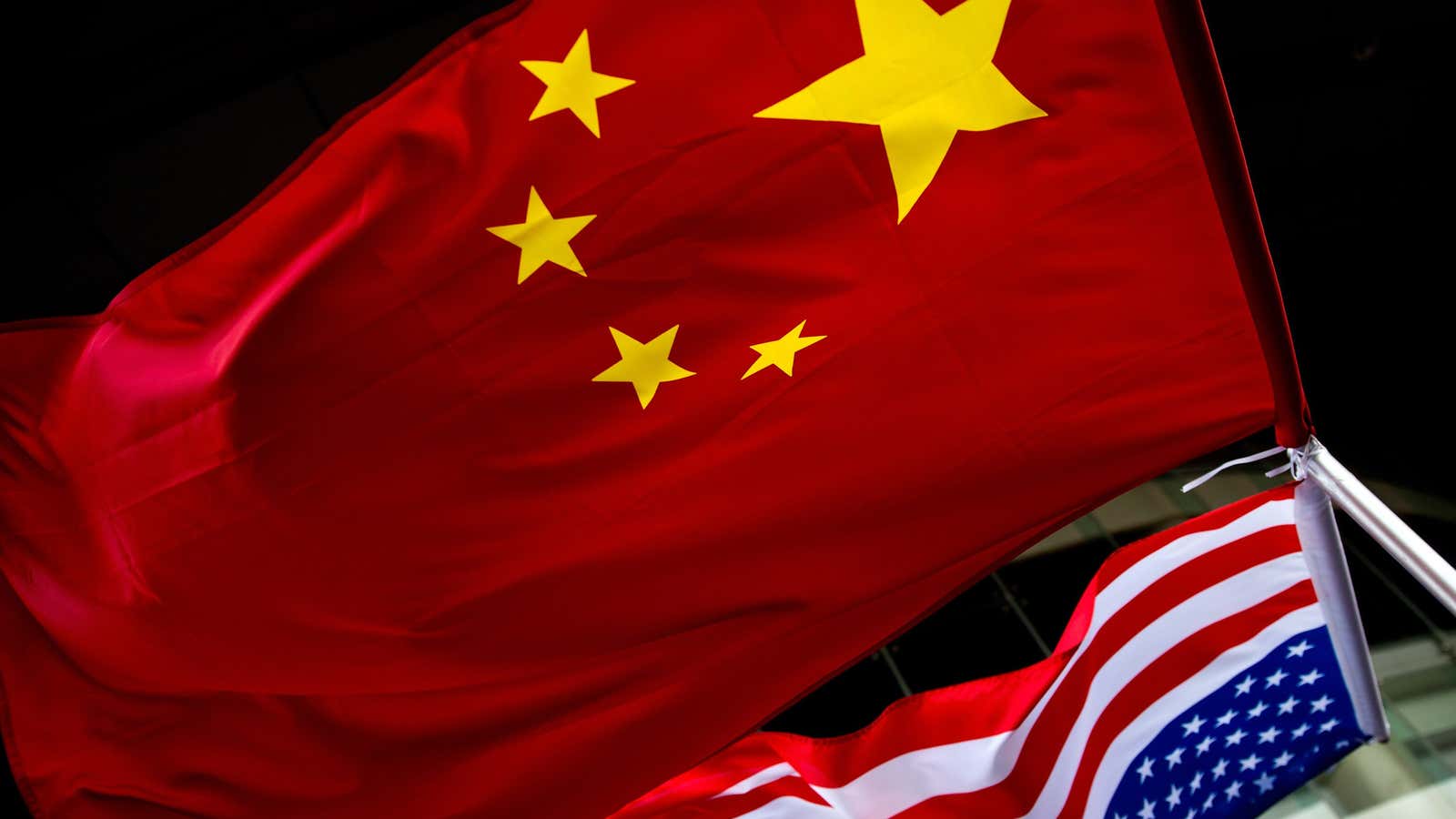China’s appetite for US investments is higher than ever, but China’s growing fears about capital outflow and a generally trade-averse Donald Trump administration could cause deals to grind to a halt.
The country has invested some $64 billion in the US since 1990, according to the latest figures from research firm Rhodium Group. Most of that came after 2008, and last year, Chinese foreign direct investment (FDI) into US surpassed FDI flowing from the opposite direction for the first time ever—with US firms investing a total of $13.1 billion into China, and China investing $15.3 into the US.
High energy
Most of the China’s FDI in the United States has been directed at the energy industry.
Many Chinese state-owned enterprises wanted a foothold in energy in order to to satisfy the country’s gargantuan appetite for oil and gas, and have looked to US firms to help them expand. China Petrochemical (known as Sinopec) spent $2.5 billion (paywall) to buy one-third of Ohio-based Devon Energy in early 2012, while China National Offshore Oil Corp. invested up to $2.16 billion for Oklahoma-based Chesapeake Energy in 2010.
However, in recent years, China’s FDI shifted away from energy and into other sectors, as Beijing attempts to move its economy into a more consumer-driven one and cut overcapacity in its bloated state-owned sector.
Public and private capital
Most of the money flowing into the US from China technically originates from private companies, rather than state-owned enterprises. Of the top ten investors, four are state-owned, while six are private. But many of the biggest deals in recent years stem from nominally private Chinese companies with strong ties to the government, rendering such labels insignificant.
Shanghai-based Fosun (paywall), for example, is considered China’s biggest private conglomerate, and the fifth-largest Chinese investor in the US according to Rhodium. Yet Fosun chairman Guo Guangchang is a member of the National People’s Congress, China’s main legislative body. In 2015 the company made two major acquisitions, including a deal to buy 80% of insurer Ironshore and a $433 million deal to purchase Meadowbrook Insurance Group.
Another well politically-connected (paywall) conglomerate is Anbang Insurance Group, which Rhodium ranks as the top investor in real estate and hospitality. The company drew attention this year for its $6.5 billion bid to purchase a group of hotels including the Four Seasons from Blackstone group, and its failed attempt to buy Starwood, owner of the Sheraton hotel chain, for $14 billion. Anbang’s Chairman Wu Xiaohui was married to the granddaughter of Deng Xiaoping, China’s top leader in the 1980s and 1990s, while Chen Xiaolu, the son of a prominent People’s Liberation Army official, is on its board of directors. The company’s murky shareholding structure has caused observers to speculate Wu and Anbang act on behalf of the state.
Uncertainties
Despite the uptake in Chinese money flowing into the US, it’s possible the trend might slow. In Washington, politicians are setting the stage to cut off Chinese acquisitions more aggressively over political concerns—whether that’s acquiring military technology, censoring entertainment, or simply acquiring competitive advantages at the expense of US industry as a whole.
In September, after nearly a year of headlines about Anbang and other Chinese acquisitions, Congress called for a review of the Committee on Foreign Investment in the United States (Cfius), the organization responsible for vetting overseas acquisitions of US firms. In a document, the US Government Accountability office specifically singled out the rise of Chinese companies with state ties as worthy of more scrutiny, noting that some acquisitions might ultimately be bad for competition. Meanwhile, in November, President Obama played a direct role in blocking China’s Fujian Grand Chip from purchasing the German semiconductor firm Aixtron.
China considers semiconductors a critical industry for moving its economy away from low-end manufacturing towards higher-value products, and also to keep its broader tech industry less reliant on foreign companies. The US fears Chinese acquisitions of its semiconductor firms could pose a national security threat, given their potential use in military technology and China’s frequent cyberattacks.
Trump’s ascendancy could easily expedite this trend. The president-elect won the election on a vaguely-defined platform skeptical of free trade. While he has yet to make a major point of Chinese money flowing into US industry, his trade advisor, Peter Navarro, remains extremely critical of China’s business practices, its political influence, and its economic rise in general. Both men would be loathe to see state-affiliated Chinese conglomerates buying American companies, especially if such purchases lead to an exodus of American jobs.
Meanwhile, Chinese authorities are also starting to curb overseas investments, in order to keep capital inside the country. In late November news broke that the central government will attempt to bar acquisitions valued at more than $10 billion, as well as purchases valued at $1 billion in industries that fall outside the buyer’s core line of business.
